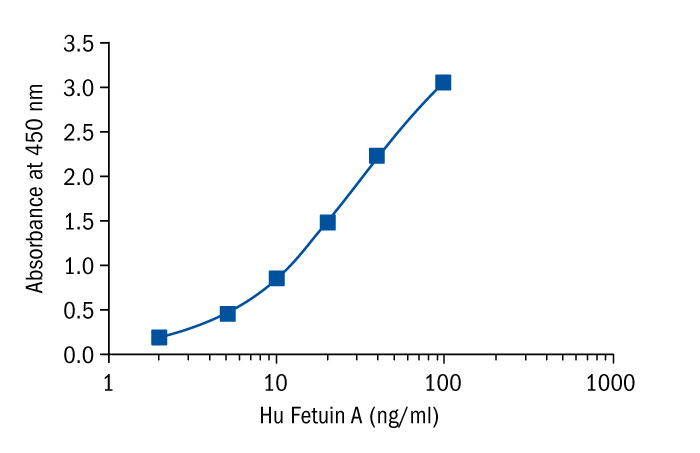Fetuin-A (AHSG) Human ELISA | RD191037100
- SKU:
- RD191037100
- Availability:
- In Stock
- Regulatory status:
- RUO
- Type:
- Sandwich ELISA, HRP-labelled antibody
- Other names:
- Alpha-2-HS-glycoprotein, Ba-alpha-2-glycoprotein, Alpha-2-Z-globulin, Fetuin A, AHSG, FETUA, PRO2743
- Species:
- Human
- Size:
- 96 wells (1 kit)
Description
Fetuin-A (AHSG) Human ELISA | RD191037100
Features
- European Union: for in vitro diagnostic use
- Rest of the world: for research use only!
- The total assay time is less than 3 hours
- The kit measures fetuin-A in serum and plasma (EDTA, citrate, heparin)
- Assay format is 96 wells
- Quality Controls are human serum based. No animal sera are used
- Standard is human plasma based
- Components of the kit are provided ready to use, concentrated or lyophilized
Research topic
Bone and cartilage metabolism, Cardiovascular disease, Renal disease
Summary
Fetuin-A (AHSG), a 59 kDa glycoprotein, consists of two cystatin-like domains and a smaller
unrelated domain. Its homologues have been identified in several species including rat (pp63),
mouse, guinea pig, rabbit, sheep, cattle, swine and human. AHSG human gene is located on
chromosome 3q27.
Liver synthesized fetuin-A is secreted into the blood stream and it is deposited as a
noncollagenous protein in mineralized bones and teeth.
Fetuin-A occurs in high serum concentration during fetal life, whereas its level declines
following infection, inflammation (by 20-30% during acute phase) and malignancy. Fetuin-A
may influence the resolution of inflammation by modulating the phagocytosis of apoptotic cells
by macrophages.
Fetuin-A acts as an important circulating inhibitor of ectopic calcification that is a frequent
complication of many degenerative diseases.
The low fetuin-A level may be associated with higher cardiovascular mortality in chronic renal
failure, liver cancer and liver cirrhosis patients on long-term dialysis.
Human fetuin-A represents a natural inhibitor of tyrosine kinase activity of the insulin receptor.
Fetuin-A may play a significant role in regulating postprandial glucose disposal, insulin
sensitivity, weight gain, and fat accumulation and may be a novel therapeutic target in the
treatment of type 2 diabetes, obesity, and other insulin-resistant conditions.
The serum and bone-resident fetuin-A binds to transforming growth factor-β and blocks TGF-β
binding to cell surface receptors.
Thus, fetuin-A is involved at least in inhibition of unwanted (vascular) calcification, inhibition of insulin receptor tyrosine kinase activity and regulation of osteogenesis.
Type
Sandwich ELISA, HRP-labelled antibody
Applications
Serum, Plasma-EDTA, Plasma-Heparin, Plasma-Citrate, Urine, Cerebrospinal fluid, Cell culture supernatant
Sample Requirements
10 µl/well
Shipping
At ambient temperature. Upon receipt, store the product at the temperature recommended below.
Storage/Expiration
Store the kit at 2–8°C. Under these conditions, the kit is stable until the expiration date (see label on the box).
Calibration Curve
Calibration Range
2–100 ng/ml
Limit of Detection
0.104 ng/ml
Intra-assay (Within-Run)
n = 8; CV = 2.9%
Inter-assay (Run-to-Run)
n = 6; CV = 4.7%
Spiking Recovery
108,80%
Dilution Linearity
110,40%
Crossreactivity
- bovine Non-detectable
- cat Non-detectable
- dog Non-detectable
- goat Non-detectable
- hamster Non-detectable
- horse Non-detectable
- mouse Non-detectable
- pig Non-detectable
- rabbit Non-detectable
- rat Non-detectable
- sheep Non-detectable
- chicken Not tested
- human Yes
- monkey Yes (recommended dilution 1:5000)







